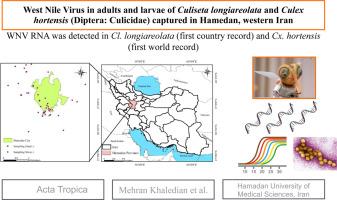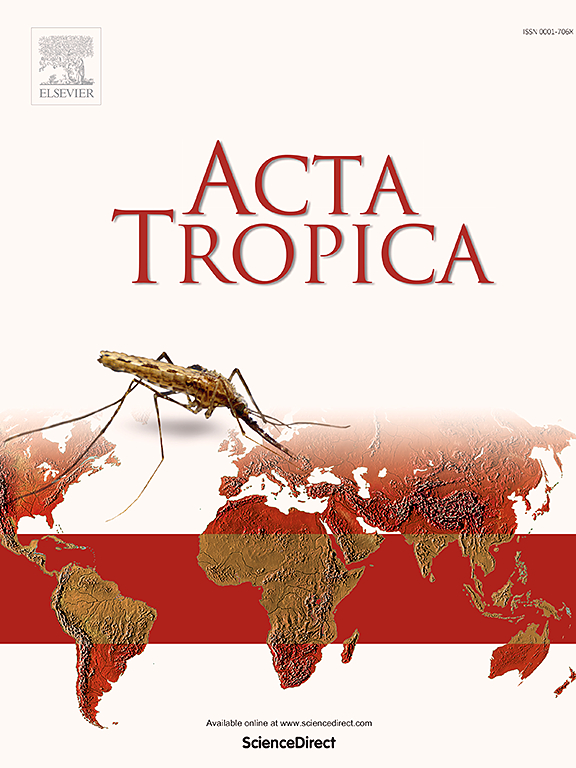伊朗西部哈马丹捕获的 Culiseta longiareolata 和 Culex hortensis(双翅目:库蚊科)成虫和幼虫体内的西尼罗河病毒
IF 2.1
3区 医学
Q2 PARASITOLOGY
引用次数: 0
摘要
西尼罗河病毒(WNV)是一种通过蚊子传播的新兴虫媒病毒。尽管西尼罗河病毒被认为是伊朗最广泛传播的蚊媒虫媒病毒,但在许多地区,这种人畜共患病原体的传播媒介仍不为人知。本研究旨在评估 2022 年在西部城市哈马丹收集的蚊子中是否存在 WNV。研究人员使用灯光诱捕器捕获成蚊,并通过浸渍技术从 45 个不同的栖息地(包括城市、郊区和农村地区)收集蚊子幼虫。对标本进行了鉴定,并根据其种类分成 69 个批次,用于提取病毒 RNA 和实时 PCR。总共捕获了 3243 只蚊子(2209 只幼虫和 1034 只成蚊),并依次鉴定为 Culiseta longiareolata、Culex hortensis、Anopheles maculipennis s.l.、Culex theileri、Culex pipiens、Anopheles claviger 和 Anopheles superpictus s.l.。分子筛选显示,在农村地区(n = 5)和城市地区(n = 2),Culiseta longiareolata 和 Culex hortensis 有 7 个 WNV 阳性库。WNV RNA 的检测表明,哈马丹的蚊子中存在活跃的病毒循环,存在向人类和动物传播的风险。这些发现确定了哈马丹的潜在病媒,尽管病媒在伊朗可能因地区而异。要全面阐明当地的 WNV 流行病学和传播动态,还需要进一步的监测。尽管如此,这项研究还是提供了重要的 WNV 活动基线证据,以指导该地区的预防策略。本文章由计算机程序翻译,如有差异,请以英文原文为准。

West Nile virus in adults and larvae of Culiseta longiareolata and Culex hortensis (Diptera: Culicidae) captured in Hamedan, western Iran
West Nile virus (WNV) is an emerging arbovirus transmitted by mosquitoes. Although it is considered the most widespread mosquito-borne arbovirus in Iran, vectors of this zoonotic pathogen remain unknown in many regions. This study aimed to assess the presence of WNV in mosquitoes collected in the western city of Hamedan in 2022. Adult mosquitoes were captured using light traps, and mosquito larvae were collected by dipping technique from 45 diverse habitats, including urban, suburban, and rural sites. Specimens were identified and pooled into 69 batches based on their species for viral RNA extraction and Real-Time PCR. In total, 3243 mosquitoes (2209 larvae and 1034 adults) were captured and identified as Culiseta longiareolata, Culex hortensis, Anopheles maculipennis s.l., Culex theileri, Culex pipiens, Anopheles claviger, and Anopheles superpictus s.l. in decreasing order. Molecular screening revealed seven WNV-positive pools of Culiseta longiareolata and Culex hortensis in rural (n = 5) and urban areas (n = 2). Detection of WNV RNA indicates active circulation in mosquitoes and risk of transmission to humans and animals in Hamadan. These findings identify putative vectors in Hamadan, though vectors likely vary regionally in Iran. Further surveillance is needed to elucidate local WNV epidemiology and transmission dynamics fully. Nonetheless, this study provides important baseline evidence of WNV activity to guide prevention strategies in this area.
求助全文
通过发布文献求助,成功后即可免费获取论文全文。
去求助
来源期刊

Acta tropica
医学-寄生虫学
CiteScore
5.40
自引率
11.10%
发文量
383
审稿时长
37 days
期刊介绍:
Acta Tropica, is an international journal on infectious diseases that covers public health sciences and biomedical research with particular emphasis on topics relevant to human and animal health in the tropics and the subtropics.
 求助内容:
求助内容: 应助结果提醒方式:
应助结果提醒方式:


